|

|
| space |
| A
Long Walk on a Short Day. |
|
June 22, 2001.
|
| By
Peter Andrews, © 2001. |
| Published:
June 30, 2001 |
| space |
|
|
For the shortest
day of the year I decided to go on the longest walk I've had
for years. The decision to do so was quite easy after a week
sitting in front of a computer, dealing with a fifty page social
research report. Living right at the foot of Mount Keira and
the Illawarra Escarpment, was another incentive to get out of
the house. Armed with a camera with only a few frames before
the end of a film, I set off around noon for the start of the
start of the Ken Ausburn Track.
The 1.57 km track
that climbs 250 metres up to the Mt Keira Ring Track, commences
at the western end of Northfields Avenue near the University
of Wollongong.
|
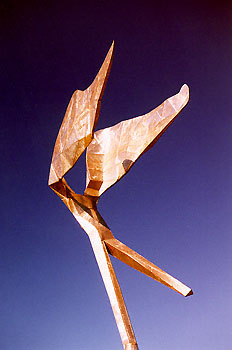
|
|
| space |
|
| The
first section of the track up to Flugelman's stainless steel memorial
to Lawrence Hargreaves, is quite steep in places and some sections
are covered with a timber boardwalk and stairs. Not only easier
to climb, the boardwalk also prevents soil erosion around this
steep area. The memorial is basically at the lower end of ridge
that runs down from the top of Mt Keira. It is along this ridge
the track continues up the mountain to connect with the Mt Keira
Ring Track. |
|
| space |
|
| The
view from the memorial is quite good, but gets better the further
up the track. After following the ridge for about five minutes,
you arrive at a lookout with views up the coast towards the Royal
National Park just south of Sydney. Up to this point, one can
clearly see the results of work done by volunteers and National
Parks and Wildlife Service staff to restore native vegetation
and weed removal. |
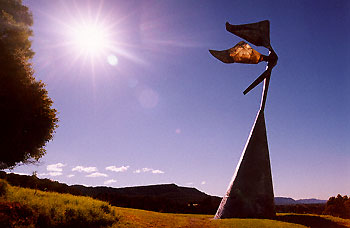
|
|
| space |
|
| After
bushfires consumed much of the escarpment in 1968, areas with
little or no canopy have been completely overrun with
imported Lantana
and other weeds. Work has focused on the clearing of the Lantana
and weeds while native trees such as Red Cedar have been replanted.
Red Cedar was almost completely wiped out during the early years
of settlement in the Illawarra and despite an absence of old growth
specimens, the species now has a chance to now make a healthy
comeback. |
|
| space |
|
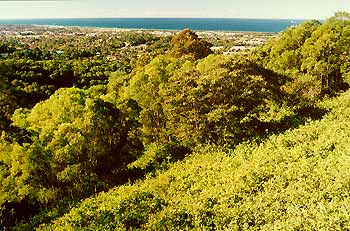
|
Where native vegetation has been
cleared in some way, the area is quickly overrun with Lantana,
as seen from the lookout above the memorial.
|
|
| space |
|
| Continuing
past the lookout the track begins to climb and the vegetation
tends to get a little thicker. Not far up is a junction with another
track to the left that runs behind the end of a fence. As there
were no signs, I thought I would check it out. After about 10
metres, this track comes out at a large clearing which is the
now closed Kemira Colliery. What appears to be the entrance to
the old mine is all securely locked. |
|
| space |
The blocked entrance of Kemira
Colliery.
|
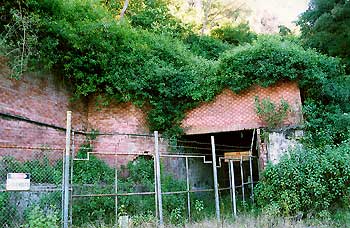
|
|
| space |
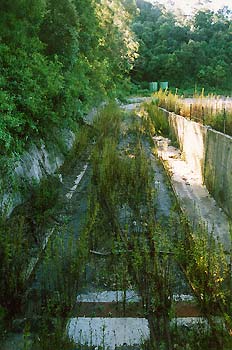
|
Remnants
of the top section of the early rail incline can be clearly seen.
Although research of a book by Eardley at the Wollongong City
Library tends to suggest that the section shown in the photo,
was used just to deliver loaded wagons from the portal to the
incline section. The very first rail line in the Illawarra commenced
at the bottom of this incline section around the late 1850s to
transport coal down to Wollongong Harbour. The line was operation
well before the government of the period had got around to built
the main railway line down from Sydney.
|
|
| space |
|
|
Opened in 1857 and originally called the Osborn
Wallsend (Mt. Keira) Colliery, Kemira was not only one of the
first coal mines in Australia but it was also one, if not, one
of the longest running coal mines to operate within the country's
short European history.
In October 1982,
the mine appeared in news media all around the world as 30 miners
staged a 15 day sit-in strike in protest against retrenchments
at the colliery. While the Southern District Miners' Federation
Womens' Auxiliary fed the men from a kitchen at the entrance
of the mine, a reported 2,000 protesters
from the region turned up to voice their anger at the nation's
Parliament House in Canberra. At the time, there was little
Canberra could really do as people at that time were loosing
their jobs in many of the industrialised countries all over
the world due to the global economic conditions.
|
|
| space |
|
After a quick look around, I went
back to the main track and continued up to the ring track. After
another hour of wandering around, it was time to call it a day.
|
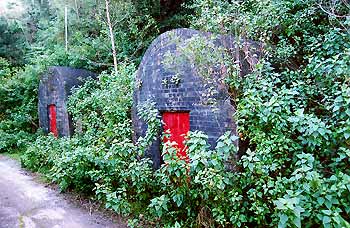
|
|
|
|
| |
| |
|
| |
| |
|
To the Illawarra Escarpment
Contents Page
|
|
|
|
| |
|
Peter Andrews © 2001.
All Rights Reserved.
|







